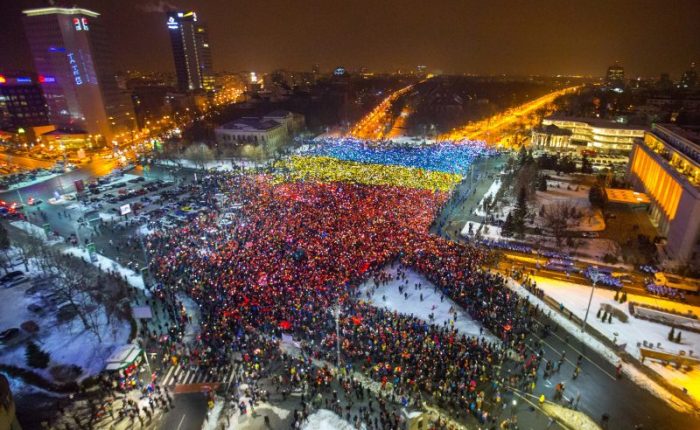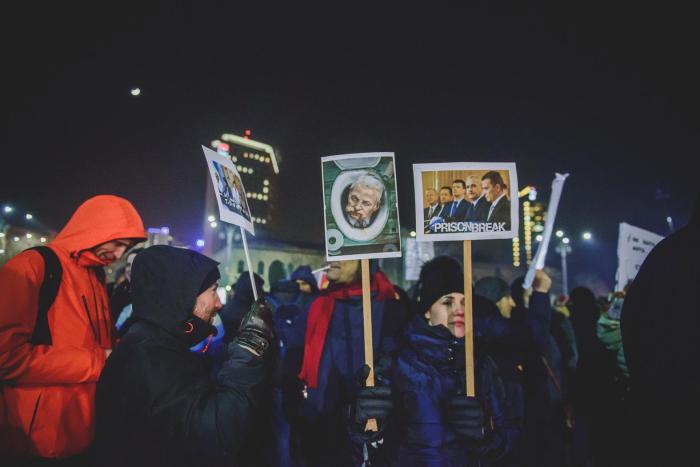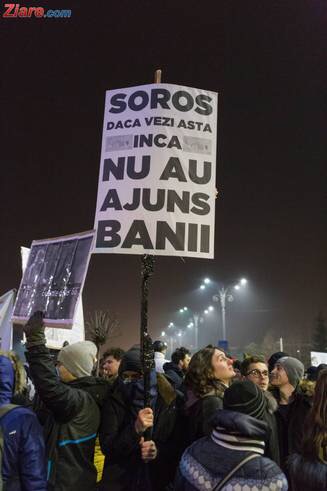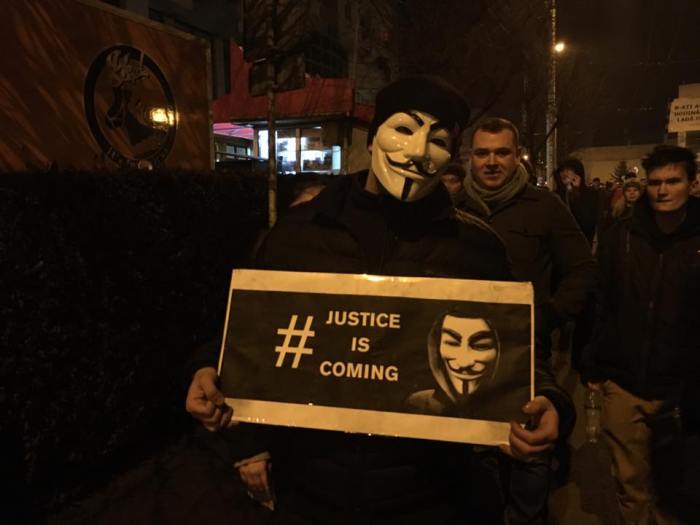And on the 13th day, there was light: 70,000 protestors lit up Piata Victoriei in Bucharest at 9pm on February 12th in an unforgettable display of Romania’s tricolor of red, yellow, and blue. The tricolor projected by the lights of thousands of individual cellphones evoked two clear messages: that the lifeblood of a democracy is the will of its people, and that after 27 years after the fall of Communism, the nation is shining a light into the dark corridors of its government’s endemic corruption. Romania’s “White Revolution” has come 27 years after the fall of Communism.
The widespread protests erupted on the evening of January 31st, when the government attempted to pass an incendiary emergency executive ordinance (OUG 13) that would have decriminalized various forms of corruption at 10pm presuming that no one would take notice. Such a move was not without precedent: for 27 years, Romanian politicians have often slipped through morally depraved decrees with the sound reassurance that an apathetic populace resigned to its fate under crooked rule would not bother to peruse the terms. About 2,000 politicians, many in the ruling PSD party, would stand to gain from the proposed clemency and measures of leniency, particularly PSD party leader Liviu Dragnea, who faces corruption charges of defrauding the state of 24.000€ ($26,000). Should the decree pass, even for one second, it would effectively eliminate their pending files and clear their records. This isn’t a mere obstruction of justice, this a complete disregard and perversion of the very concept of justice in Romanian legal terms.
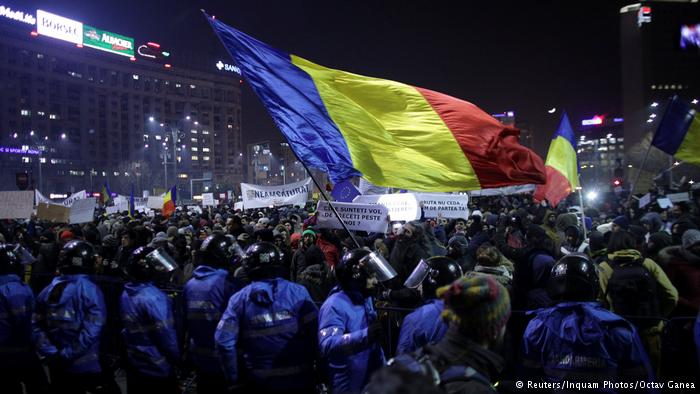
The prevailing hope is that the young generation is now rising to carry out the unfinished business of the 1989 revolution. “I was there when the miners came [to violently topple the protests] in 1990. After so many years, my hope is that this is the end of the cycle: that what we started then, our youth will now finish,” declared a protestor in Piata Victoriei in Bucharest on the evening of the momentous color spectacle on February 12th.
The witty placards, technological prowess, and powerful imagery that have gained these protests world-wide attention give the impression that Romanians are professional protestors as the recent protest scenes are exemplary in many ways, resembling rock concerts with live musical performances, flashlights, and projections on nearby buildings of protests slogans such as “Resist,” and “We’ve had enough.”

So far, the protests have at best succeeded at slowing the ordinance’s passage and bringing about the resignation of the Minister of Justice Florin Iordache. While Ana Birchall has been named as the interim Minister, discussions have floated questioning the probability of Victor Ponta being designated the next Minister of Justice. While the current Prime Minister of Labor Olguta Vasilescu mentioned the possibility, Victor Ponta has declared that he has no intention of becoming Minister of Justice (“last time I was Minister of Justice, I made nothing but mistakes” he stated), nor has anyone proposed the position to him.
As far as halting the ordinance, the government has since introduced OUG 14 to repeal the corrupt OUG 13. However, it’s possible for the decree to enter into effect: Ordinance 14 (which passed through the Senate and Chamber of Deputies earlier this week) was challenged in the Court of Appeals in Bucharest, as it appears to have some elements that may not be constitutional. Thus, it remains very possible that the highly protested OUG 13 can still enter into effect.
Many still fear the loopholes left in the wake of OUG 13’s ambiguous repeal, as the Constitutional Court of Romania (CCR) declared last week that the government acted in a perfectly legal manner in attempting to pass the decree in the middle of the night. Clearly, the CCR emphasized form over substance in their consideration of the matter by claiming that no conflict exists between the judicial branch and the government.
In the wake of judicial indifference and procedural lethargy, protests have continued: “On any night, we can wake up to find that some infraction has been decriminalized,” a protestor decried. “We want to work, not to supervise you.”

The Romanian diaspora, which numbers around 4-6 million, has demonstrated its solidarity in the call for justice, turning out varying numbers of protestors throughout Belgium, Canada, Germany, Italy, Spain, the Netherlands, the United Kingdom, and the United States. The rallying of the Romanian diaspora also played a significant role in the election of pro-EU President Klaus Iohannis of the National Liberal Party (PNL), as the turnout of the Romanian diaspora numbered about 379,000 voters in Europe alone, paving the way for Iohannis’ triumph over Victor Ponta in November 2014. President Iohannis has remained firm on his campaign promises to tackle corruption and strengthen the independence of the judicial system, and in a move that was widely condemned by the left, even joined the protests on the first evening and called the measures an offense to justice. President Klaus Iohannis made an impassioned speech before the government last week, declaring: “You have been elected, now you govern. But with transparency and morals.” The PSD party collectively walked out in disdain in the middle of his speech.

Amidst internal and international protests, Liviu Dragnea and Calin Tariceanu, the leadership of the PSD-ALDE (Alliance of Liberals and Democrats) coalition have slowed the repeal process and seem to exploit every possible means of evading OUG 13’s repeal. Meanwhile, they have embarked on a disinformation campaign to detract from their wrongdoing, framing the debacle as a political and ad hominem issue, rather than a moral issue and labeling the protestors as “Iohannists” who are being financed by billionaire George Soros and manipulated President Iohannis himself who, they claim, seeks a hostile take-over (or systemic destabilization) of their democratically elected government. They also speak of the entrenching power of the DNA, which they claim is overstepping its boundaries of authority as an institution and threatening their democratic rule, and accuse the DNA’s chief prosecutor Laura Kovesi of denigrating Romania’s reputation on the international stage for expressing her worries about the recent events. Only begrudgingly have they agreed to withdraw the ordinance, as Liviu Dragnea ardently opposed withdrawing the ordinance during the first few days of the protest, declaring that the government’s action was legal.
Throughout the day on February 5th, Liviu Dragnea repeatedly threatened to stage a PSD counter-protest “of those people who weren’t manipulated by Iohannis,” which brought out several hundred protestors in front of Cotroceni Palace, the President’s place of residence. A majority of these protestors are senior citizens who sympathize with the PSD government’s promises to raise their pensions. Meanwhile, Liviu Dragnea continues his charade to emerge on top, asserting his innocence and attempting to brush the mess of recent events under the rug, offhandedly dismissing reporters’ probing questions into whether the events have affected his on-going case for his abuse in service, which has been postponed at numerous stages in the past two weeks. The French newspaper Le Monde has termed him “the face of Romanian corruption,” and perhaps with good cause: when asked about Romania’s anticorruption fight in an interview with Swiss media on December 12th following PSD’s parliamentary victory, he replied: “I want to talk about Romania’s future, not about this bullshit.”
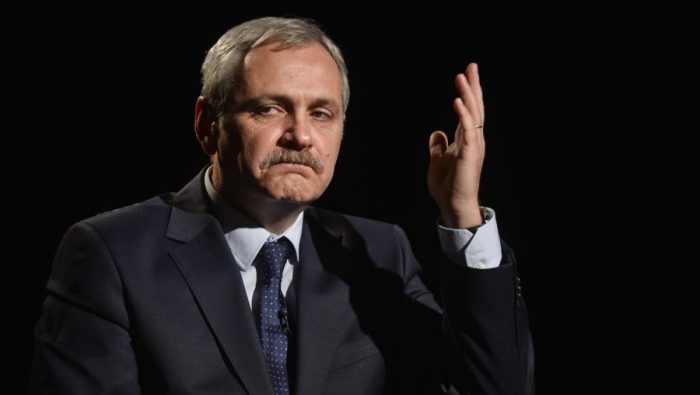
While some political analysts have stated that the PSD party does not represent a continuation of Romania’s future (especially due to its ties to the former Communist party), a majority of the protestors support the legitimacy of the elected government. However, voices on the street claim that they don’t believe the government’s acquiescence and call for the Prime Minister Grindeanu’s resignation. This isn’t necessarily a war against a particular party, but against a corrupt ruling class of kleptocrats who have left them demoralized and disillusioned with their current democracy. Since its revolution, Romania’s reform attempts have been all but blocked by the stubborn inertia of such leaders, who fear a loss of power at the expense of reform. The protestors aren’t necessarily calling for new elections. Most individuals accept the PSD victory of December 12th. However, they call for new leadership of the PSD party – a clean slate in the purest sense, not white-washed criminal records. Protestors laid out banners in Piata Victoriei citing: “We respect the vote. We ask for a new, competent, and clean government.”

Romania’s government has faced numerous reprimands from its Western allies, who warn that backtracking on corruption and disregard for European value’s undermines its position in the EU and NATO, and places Romania at risk of losing EU funds as well as its very right to vote in the EU. European Commission President Juncker and First Vice-President Timmermans declared: “The fight against corruption needs to be advanced, not undone.”
The most scathing reproach has come from the noted Eurosceptic former UKIP leader Nigel Farage of Great Britain, who stated, “It’s unbelievable that we are in a political union will a country like Romania. They should have never been allowed to join [the EU].”
Meanwhile, the resistance of Romania’s protestors has also become a beacon of hope for Southeastern Europe (particularly Bulgaria and Italy) as taking a stand against anti-corruption. As the fate of OUG 13, and consequently, Romania’s sense of justice, hangs in the balance, it’s clear that the Romanian citizenry has undergone a definitive awakening of its social consciousness. As President Iohannis asserted: “The nation is alert. It is alive. And it is very unsatisfied.” The Romanian electorate will most likely face a referendum proposed by the President in March regarding the fight against corruption.

While it is difficult to say whether this “White Revolution” will ultimately succeed in ousting the PSD government, reshuffling those in government, or ensuring demands for transparency, a certain democratic evolution has emerged. A populace that feels disillusioned, disrespected, mistreated, and tired of the manipulative exploits of its media has mounted a protest of resistance.
Romania remains no less stable in the wake of its protests, as these protests have been largely peaceful. However, a blow to the rule of law would obliterate its legitimacy. As Robert Schwartz attested: “It is not our country that is in danger, but rather our democracy.” This isn’t just about the repeal of an ordinance, but about the evolution of a society that demands an end to deceit and populism. This isn’t just about an ordinance written on a piece of paper, but about the collective consciousness, about Romania’s future as a nation.
Thousands of Romanians have taken to the streets and lit up the nation’s soul in a defense of democracy, the rule of law, the reign of justice, and a society based on moral values and accountability. Hopefully, Romanians will remain alert and deepen their civic engagement to root out corruption at all levels, so that in the wake of this White Revolution, “No one will ever be able to govern in the dark again.”
